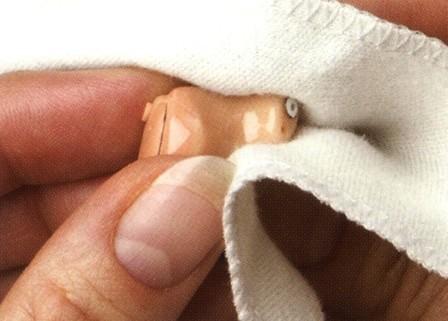|
www.HealthyHearing.com |
Hearing aid repairs
By Mandy Mroz, AuD, Former President, Healthy Hearing Last updated on: November 16th, 2023 Despite your best efforts, you may still need a hearing aid repair at some point. Here's how to keep your hearing aids in good shape and what to do if you experience a problem. Hearing aids are tiny marvels of technology. Despite their small size, they contain a lot of sophisticated parts and perform many advanced functions every second. If your having issues with yours, read on to find out about troubleshooting problems and what to do if your hearing aids seem broken. Troubleshoot common hearing aid issuesThis detailed troubleshooting guide can help. If your hearing aid still isn't functioning properly, the following steps may be completed before calling a hearing healthcare professional:
When to get more help for a repairDespite your best and most diligent efforts, all hearing aids will probably need a repair at some point. Here is when to visit your hearing healthcare professional:
Your hearing practitioner may be able to make some repairs "in-house," and then you avoid being without your hearing aids for several days. Sometimes, this just isn't possible. They can tell you how long it will take to get the aid repaired by the manufacturer and if there are any associated costs if your aids are not under warranty. Preventing the need for repairs: Keep your hearing aid clean
are kept clean. Because hearing aids are such compact devices, it can be easy for earwax and other debris to become trapped in tiny holes and spaces. It’s important to clean the device each day with a clean and dry tissue or cloth. This prevents excessive build-up from clogging the microphone and sound ports. When this happens, feedback can occur. More: How cold weather and moisture can impact hearing aids Also, keep your ears cleanIn addition to keeping the hearing devices themselves clean, it’s important for you to keep your ears clean, too. Keeping the devices and ears free of debris can lessen the need for frequent hearing aid repairs. Earwax is natural and protects your inner ears, but it can cause trouble if it becomes lodged in ports or crevices of the hearing aids. To keep earwax to a minimum, clean ears with a washcloth daily. Keep in mind it’s not safe to insert cotton swabs or anything sharp in your ears to clean them. Using these items could push the earwax deeper into the ear or puncture the eardrum. Lastly, keep hearing aids dryProlonged exposure to moisture is the leading cause of repair in hearing aids. Most people don’t realize how much moisture hearing aids can accumulate with daily use. At night, open the battery compartment and remove the batteries to allow aids to air out. It's wise to invest in a hearing aid sleeve or sweatband if you live in a humid area or exercise a lot. Another tool to help keep devices dry is a hearing aid dehumidifier. These inexpensive devices can help keep moisture to a minimum and can possibly prolong the life of hearing aids. Wash and shower before putting hearing aids in for the day. Use care when applying hair and face products as these can build up on and inside hearing aids. Take hearing aids out when swimming or engaging in water activities. Need help?Have you tried all you can and nothing is working? It may be time to get new hearing aids. After all, hearing aids are only meant to be worn 3 to 7 years. They endure lots of wear and tear, and technology improves all the time. If you currently wear hearing aids and need to find a professional to help with a repair, use our extensive consumer-reviewed directory to find a hearing care professional in your area. Mandy Mroz, AuD, Former President, Healthy Hearing
You are reading about: Related topics
More information about hearing loss, hearing aid brands, assistive devices and tinnitus. Featured clinics near me
Earzlink Hearing Care - Reynoldsburg Find a clinicWe have more hearing clinic reviews than any other site! Related contentThe Healthy Hearing Report |
|
www.HealthyHearing.com |
Hearing aid repairs
By Mandy Mroz, AuD, Former President, Healthy Hearing Last updated on: November 16th, 2023 Despite your best efforts, you may still need a hearing aid repair at some point. Here's how to keep your hearing aids in good shape and what to do if you experience a problem. |



 Dr. Mandy Mroz earned her doctorate in audiology from the University of Florida. Mandy’s career is guided by her dedication to serving people with hearing loss and her past experience in hearing research, training and management.
Dr. Mandy Mroz earned her doctorate in audiology from the University of Florida. Mandy’s career is guided by her dedication to serving people with hearing loss and her past experience in hearing research, training and management.